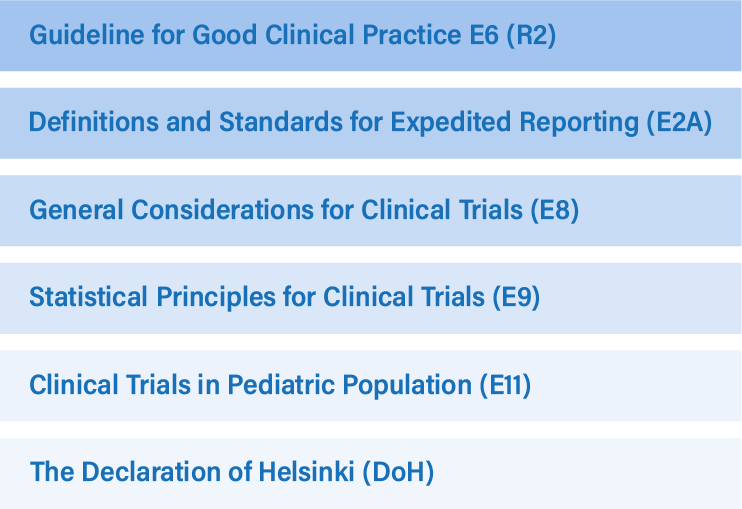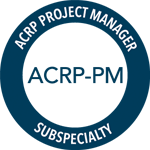The Association of Clinical Research Professionals
ACRP-PM Specialty

Eligibility

To be eligible for the ACRP-PM® Specialty exam, you must currently hold one of the following ACRP Certifications
Exam Content

The ACRP-PM® exam consists of 60 multiple choice questions that must be answered within 90 minutes.
The exam is referenced only to the International Conference on Harmonization (ICH) Guidelines. No other regulatory framework is tested, including country-specific regulations (i.e, FDA or EMA).
The following are the only references for which the ACRP Certification exam content can be supported:
-
Guideline for Good Clinical Practice E6 (R2) >
-
Definitions and Standards for Expedited Reporting (E2A) >
-
General Considerations for Clinical Trials (E8) >
-
Statistical Principles for Clinical Trials (E9) >
-
Clinical Trials in Pediatric Population (E11) >
-
The Declaration of Helsinki (DoH) >
We strongly encourage you to also review the Detailed Content Outline for the ACRP-PM® exam.

How to Apply

Review the Detailed Content Outline and make sure your experience and work hours are appropriate, as outlined in the Eligibility tab.
We also strongly encourage you to review the entire ACRP Certification Handbook, which provides full details about every facet of ACRP Certification.

Create a free ACRP account so you can begin the application process. Follow the on-screen prompts to enter any requested information and documentation.
If you already have an ACRP account, please proceed to step three.
Create Account >

You’re almost there! Please note, applications selected for audit will undergo a formal review by ACRP’s subject matter experts. In most instances, you will receive a status update about your application within 7 business days.
In accordance with the Americans with Disabilities Act, ACRP will provide reasonable accommodations for candidates with disabilities. Please complete this special accommodations form for submission with your application before proceeding.
Scheduling & Testing
ACRP’s testing partner PSI offers in-person testing, as well as on-demand remote testing available 24 hours a day, every day, during the testing windows.
Watch these videos to learn what to expect from each option before scheduling your exam.
Preparing to Test

The best way to prepare for the ACRP-PM® exam is to fully understand the scope of the exam content and its references.
Please be sure to thoroughly review the following:
-
ACRP-PM® Exam Detailed Content Outline >
-
Guideline for Good Clinical Practice E6 (R2) >
-
Definitions and Standards for Expedited Reporting (E2A) >
-
General Considerations for Clinical Trials (E8) >
-
Statistical Principles for Clinical Trials (E9) >
-
Clinical Trials in Pediatric Population (E11) >
-
The Declaration of Helsinki (DoH) >
-
ACRP Certification Handbook >
REMEMBER: The exam is referenced only to the International Conference on Harmonization Guidelines. No other regulatory framework is tested, including country-specific regulations (i.e, FDA or EMA).

Review the additional resources listed below to enhance your knowledge of the content area.
-
Improving Recruitment, Accrual, and Retention in Clinical Trials
-
Inspection Readiness: Best Practices for Managing Clinical Trial Inspections
-
Mastering Budgeting at Your Site: Building and Negotiating Clinical Trial Budgets that Make Sense
-
Key Skills for Ensuring Quality Control through Risk-Based Decision Making
-
Building Quality Management Systems for Sites and Sponsors: Root Cause and CAPA
After Your Exam

Exam results are shared immediately at the conclusion of your exam, but PSI will send you an email with your full score report within 24 hours.
Your ACRP account will reflect your results within 3 weeks of your exam date.

Congratulations! You just passed a major milestone on your professional journey and are now a member of the elite club of ACRP Certified clinical research professionals.
Keep an eye on your email because you will soon receive information from our digital badging partner Credly about claiming your digital badge and how you can use it to tout your accomplishment. Also learn how to use your new credential by reviewing the Certification Mark policy.

 This trusted mark of excellence in clinical research is awarded to clinical researchers who have demonstrated proficiency of specific knowledge and skills by passing the standardized ACRP-PM® Certification Exam.
This trusted mark of excellence in clinical research is awarded to clinical researchers who have demonstrated proficiency of specific knowledge and skills by passing the standardized ACRP-PM® Certification Exam.


